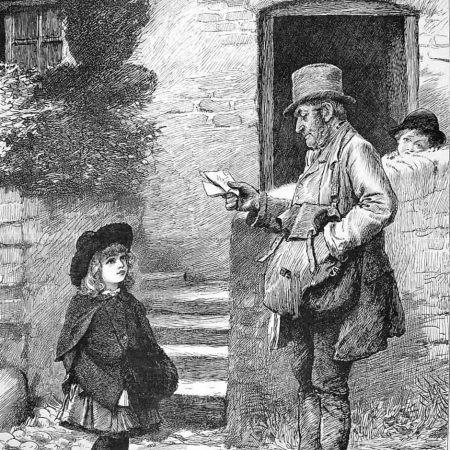Christmas is a time of good cheer, but in 1852 a cold blast of austerity struck the country, nowhere was spared, not even Romsey. Local traders had commonly distributed gifts to their most favoured customers in the form of Christmas Boxes. However, a notice in the Hampshire Telegraph of Saturday December 25 1852 read ‘ROMSEY – We understand the Grocers of this town have announced their intention by means of hand-bills, of discontinuing the good old custom of giving Christmas Boxes’.
In the same year the nation’s Letter Carriers were also deprived of Christmas gifts. Letter Carriers, (renamed Postmen in October 1883), were issued with a uniform jacket and a top hat, but they were required to supply the remainder of their clothing themselves. For very many years it had been the custom for Letter Carriers to receive small gratuities of cash, or perhaps goods from kindly people on their rounds. These gifts had been ignored or even tacitly condoned by the General Post Office, and Letter Carriers had come to regard them as being in lieu of their poor wages. Many Letter Carriers had cards printed to remind their ‘customers’ that Christmas was coming, and a small gift would be much appreciated.
However, in 1852 the GPO prohibited Letter Carriers from soliciting gifts or favours, but made no increase in their wages. This drew an immediate response from the Letter Carriers of 369 Post Offices, who wrote Memorials or Petitions to the Earl of Hardwicke, Postmaster General, which were presented to Parliament on December 16th 1852. Many of the petitions contained the same grievances. A selection of eight petitions were published by the House of Commons on February 18th 1853.
The more notable grievances were: Liverpool – [The Carriers] ‘have not the slightest opportunity of increasing their incomes by any other occupation, having four deliveries a day, {and} sorting, from a quarter before six in the morning, until eight o’clock at night.’ Leeds – ‘By recent additions to the mails here, our hours of labour have been increased by two hours per day, without any addition to our wages.’
In response, the GPO quietly relaxed the prohibition on soliciting gifts, and providing they were not excessive, life went on as before.
Contributed by Roger Harris, Romsey Local History Group

